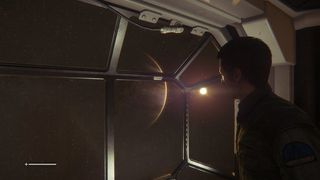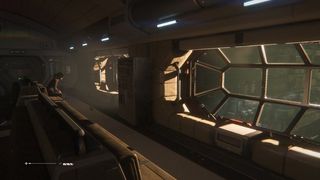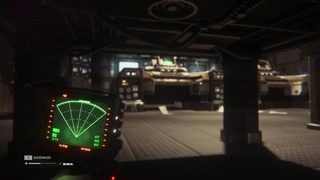How Alien: Isolation changes the rules for licensed games
I had a very strange, very surreal, and rather profound experience when I first started playing Alien: Isolation. I was hoping for great things, of course. Having covered the game since its announcement, and possibly even dreamed it into being a few months earlier with this article--I’m still investigating whether my writing has magic powers--I had a great deal of faith that it would be a highly authentic video game translation of the film I love so dearly. But even armed with a year’s experience and expectation, I was utterly unprepared for what happened when I first got in control of the final game.
Waking up from that hypersleep pod and taking my first, gingerly-trodden steps around the harsh, clinically sterile environs of the Torrens’ proxy-Nostromo, I was slammed cleanly in the face with a feeling that no game had given me before. I knew this place. I knew it intimately. This was something different to, and far beyond, the usual, sense-heightened excitement of exploring a new, well-realised game world. I was in a real place, one that I’d been to dozens of times before, but never actually set foot in. I was in Alien.

Do not mistake my words for those of an excitable fanboy, giddy at the sight of an accurate visual depiction of one of his favourite cinematic worlds. What Isolation does is more than that. The feeling it gave me--and still does--is one of more than aesthetic recognition. It isn’t just about looks. As I moved around that cryosleep bay for the first time, looking under and around things that I had previously only ever seen from one angle on a TV screen, and touching things that had before remained resolutely 2D, I found myself inside, and physically involved with, a world that I have instinctively known for decades. One that I had always understood that I could never truly inhabit, but was somehow finally inhabiting nonetheless.
It was more than the digital reconstruction of the movie’s art assets. It was in the lighting, the background noises, the ambience. It was in the subdued, weary, subtly ominous background chatter of my crewmates. In was in the quiet, deftly drawn interplay between bleached, utilitarian angles and domestically cluttered, lived-in tarnish. It was the whole atmosphere and feel of the place.
My surroundings immediately put me in mind of that Oculus Rift recreation of the Seinfeld set from earlier this year. Or rather, it put me in mind of the effect it had on people. The hook of exploring Jerry's Place in VR was not about playing a Seinfeld game. The mod didn’t attempt or intend to create that at all. Instead, it was in the magic of experiencing the immediate, 3D, total-immersion presence of a place that previously existed only between carefully-framed shots of half-formed film sets and the part of the fan’s brain that fills in the gaps to make them real.

Alien does that too. It does it from its first moments, and throughout the duration of its mammoth running time. It’s more than a game based on a film world. It’s a tangible experience set inside it. That’s a completely different thing to anything we’ve seen before and, if we’re lucky, I think it heralds a whole new direction and purpose for licensed material.
The thing is, I realised in those early seconds that Isolation would work even without the Alien. Hell, it would still be amazing without the Alien. Or the androids, or the missions, or any of the gameplay at all. The sheer experience of being in the Alien universe, the sheer sense of presence in a fictional place made real, would be enough to make it a stunning creation. As a new kind of interactive exhibit, a kind of digital, cinematic art installation, it would excel in its own right.
Sign up to the 12DOVE Newsletter
Weekly digests, tales from the communities you love, and more
Regarding that gameplay though, some have complained that Isolation is too harsh. Some feel it too unforgiving, too random and too unfair. They miss the point by a country mile. In truth, that uncompromising simulation of the titular organism’s behaviour is utterly vital once the authenticity of the game’s world is established. Anything that pulled away from it, or that buried it in tonal or thematic inaccuracies, would be disastrous. Any self-consciously ‘gamey’ safety-nets or sanitisations impinging upon its realness would pull the whole damn thing apart. It is fundamental to Alien: Isolation’s true simulation of a cinematic world that the events which play out within it ring true, however at odds with the rules and conventions of traditional game design they might be.

As a result, Alien: Isolation is the most successful interactive experience ever licensed from an existing property. Batman? The first two Arkham games are wonderful. A couple of my absolute favourites of the last generation. But they create their own version of Gotham, in truth a (very cleverly) bodged-together portmanteau of multiple different existing iterations, covering film, comic books and animation. They create an authentic feeling of bat-familiarity by providing enough of what you recognise as the character’s general essence, from multiple sources, but remaining safely distant from any specific emulation.
All the other licensed games knocking around? Theme park versions at best. No more real an experience than MGM’s Indiana Jones stunt show. Even with access to their sources’ original art and audio, they create mere plastic facsimiles, tribute-band versions that look and sound vaguely right, but just don’t feel the same.

Though while official projects largely continue to be adequate at best, the modding community persists inputting out a multitude of fan-made recreations of almost any franchise you can think of. Star Wars, Battlestar Galactica, Game of Thrones… Passionate teams of talented amateurs are constantly creating homebrewed conversions for some of the biggest games around, often with admirable results despite their comparative lack of resources, or access to the original properties’ assets or creative teams. If nothing else, these projects prove that despite years of middling (or flat-out poor) licensed material from the big boys, underserved fans remain passionate about experiencing and inhabiting their favourite worlds through games.
Clearly, more developers need to follow Creative Assembly's example. Because Alien is made not just of its inspiration’s visuals and soundscapes, but of its atmosphere, soul, and entire fictional identity. It’s not just a game, but the closest we so far have to a world made real. It’s--literally--an incredible achievement in its own right, and it sets the bar a whole lot higher for all that follow it, in terms of both execution and conceptual ambition. Everyone else, take note. This is how you do it from now on.

2 weeks after launch, Escape from Tarkov-style survival horror mashup Level Zero: Extraction ends development because it "underperformed" expectations

Sony may never give us Days Gone 2, but it did just announce Days Gone Remastered is coming to PS5 with three new modes: Horde, Permadeath, and Speedrun
Most Popular




